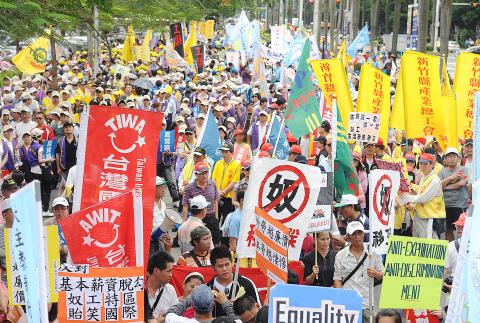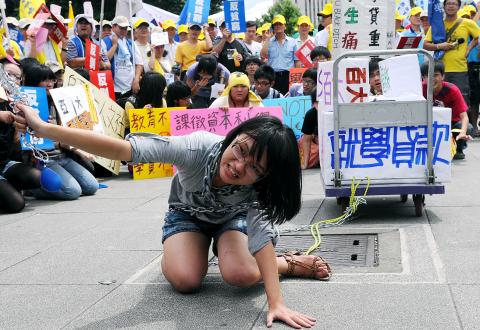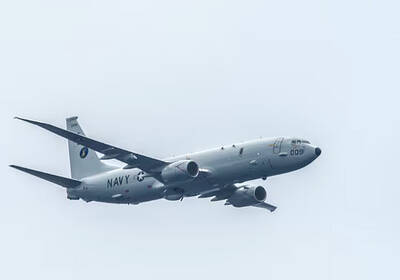More than 1,000 labor union members, activists, medical interns, nurses, migrant workers, teachers and students expressed their dissatisfaction with working conditions and the employment environment in a protest in Taipei on Workers’ Day yesterday.
Holding flags and signs outlining their demands, workers from various industries gathered at Liberty Square at noon to protest against poverty and worker exploitation.
Among a series of demands, groups called for the abolition of the responsibility system in the Labor Standards Act (勞動基準法), a reduction in the number of temporary workers and measures to protect young people’s right to work.

Photo: Liao Chen-huei, Taipei Times
Leading the parade, more than 200 nurses shouted: “We refuse to allow patients to take care of patients” and “patients can only be healthy when nurses get enough rest.”
Taiwan Radical Nurses Union member Liang Hsiu-mei (梁秀眉) said that in addition to protesting against insufficient manpower and rest hours, this year the union is emphasizing the serious problem of “freakish shift arrangements” — the unreasonable and frequent shift changes with only a few hours of rest in between, leading to exhaustion and sleep disorders.
Other protesters looked to future generations.

Photo: AFP
“We are standing out here not just for our generation, but also for our children. Many of our members’ children face difficulties in finding a stable job and often end up relying on their parents’ income,” said Yang Chun-hua (楊俊華), chief secretary of the Labor Union of the Taipei City Government’s Department of Environmental Protection.
Yang said about 20 percent of union members’ children were on student loans and about one-third of the members were still paying back credit card debt with their salary.
South Taiwan Passenger Transportation Ltd Liability Co Trade Union chairperson Chen Yun-hsiang (陳韻翔) said bus drivers were often forced to work excessive hours under poor health conditions, endangering the lives of passengers.
Holding signs that read “equality” and “minimum wage covers all workers,” foreign workers called for the same wage as local workers.
On Ketagalan Boulevard in the morning, hundreds of labor rights activists from about 30 civic groups held a protest against deteriorating labor conditions by performing sports competitions that symbolized exploitation or economic burdens faced by workers.
The “events” — a race to show that workers cannot catch up financially, weightlifting to represent the heavy economic burden on families and a pole-jumping competition to symbolize rising consumer and energy prices — highlighted the reality that the losers in the system are “guaranteed an unfair game,” said the Taiwan Labor Front, which organized the event.
Taiwan Labor Front secretary-general Son Yu-lian (孫友聯) said about one-fourth of salaried workers are unable to save more than NT$50,000 (US$1,714) a year and the majority barely make a living with their low wages.
A generation of breakdown and collapse is being created, Son said.
“Why is it that we workers only earn about 44 percent of the total income, but have to pay about 75 percent of the total income tax in Taiwan?” Alliance for Fair Tax Reform convener Wang Jung-chang (王榮璋) said, adding that the government was lying to the public with its promises of imposing a tax on the rich.
“The Executive Yuan recently announced it would raise the stock income tax threshold from NT$3 million, as initially proposed, to NT$4 million, but the income tax deduction for workers is only about NT$104,000,” Wang said.
Near the end of the rally, the activists pasted pieces of paper that read “poverty,” “exhaustion,” “blind,” “debt” and other characters on a large board decorated with a printout of President Ma Ying-jeou’s (馬英九) Facebook page.

ROLLER-COASTER RIDE: More than five earthquakes ranging from magnitude 4.4 to 5.5 on the Richter scale shook eastern Taiwan in rapid succession yesterday afternoon Back-to-back weather fronts are forecast to hit Taiwan this week, resulting in rain across the nation in the coming days, the Central Weather Administration said yesterday, as it also warned residents in mountainous regions to be wary of landslides and rockfalls. As the first front approached, sporadic rainfall began in central and northern parts of Taiwan yesterday, the agency said, adding that rain is forecast to intensify in those regions today, while brief showers would also affect other parts of the nation. A second weather system is forecast to arrive on Thursday, bringing additional rain to the whole nation until Sunday, it

CONDITIONAL: The PRC imposes secret requirements that the funding it provides cannot be spent in states with diplomatic relations with Taiwan, Emma Reilly said China has been bribing UN officials to obtain “special benefits” and to block funding from countries that have diplomatic ties with Taiwan, a former UN employee told the British House of Commons on Tuesday. At a House of Commons Foreign Affairs Committee hearing into “international relations within the multilateral system,” former Office of the UN High Commissioner for Human Rights (OHCHR) employee Emma Reilly said in a written statement that “Beijing paid bribes to the two successive Presidents of the [UN] General Assembly” during the two-year negotiation of the Sustainable Development Goals. Another way China exercises influence within the UN Secretariat is

CHINA REACTS: The patrol and reconnaissance plane ‘transited the Taiwan Strait in international airspace,’ the 7th Fleet said, while Taipei said it saw nothing unusual The US 7th Fleet yesterday said that a US Navy P-8A Poseidon flew through the Taiwan Strait, a day after US and Chinese defense heads held their first talks since November 2022 in an effort to reduce regional tensions. The patrol and reconnaissance plane “transited the Taiwan Strait in international airspace,” the 7th Fleet said in a news release. “By operating within the Taiwan Strait in accordance with international law, the United States upholds the navigational rights and freedoms of all nations.” In a separate statement, the Ministry of National Defense said that it monitored nearby waters and airspace as the aircraft

Taiwan’s first drag queen to compete on the internationally acclaimed RuPaul’s Drag Race, Nymphia Wind (妮妃雅), was on Friday crowned the “Next Drag Superstar.” Dressed in a sparkling banana dress, Nymphia Wind swept onto the stage for the final, and stole the show. “Taiwan this is for you,” she said right after show host RuPaul announced her as the winner. “To those who feel like they don’t belong, just remember to live fearlessly and to live their truth,” she said on stage. One of the frontrunners for the past 15 episodes, the 28-year-old breezed through to the final after weeks of showcasing her unique